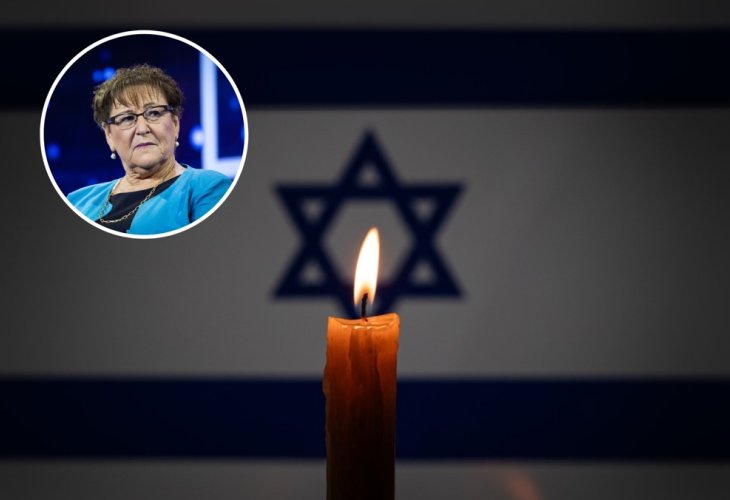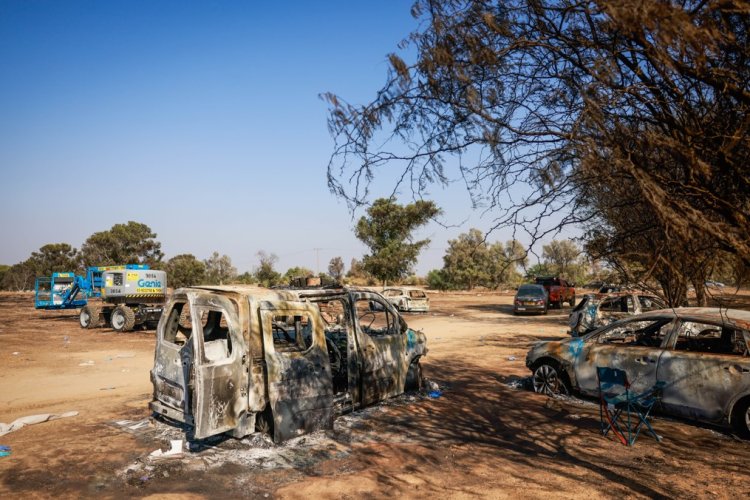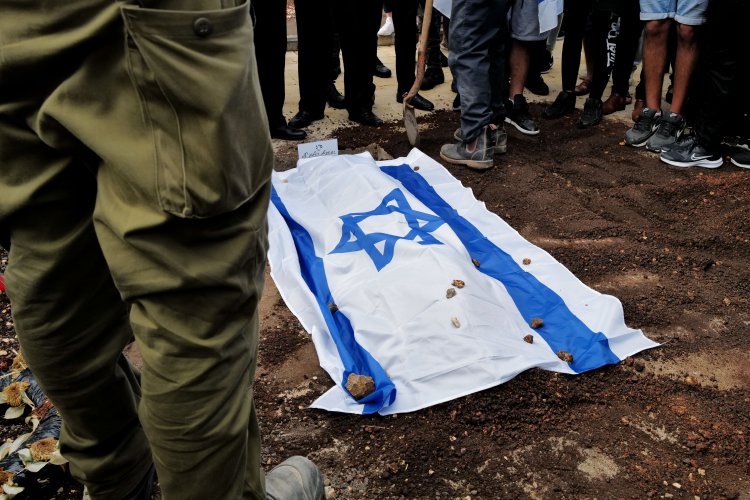Miriam Peretz: "I Move from Bereaved Family to Another, Here's What They Say"
Miriam Peretz consoles bereaved families, offering comfort and resilience. "We are a people who do not lose hope."
 (Background: shutterstock. Photo of Miriam Peretz: Yonatan Sindel / Flash 90)
(Background: shutterstock. Photo of Miriam Peretz: Yonatan Sindel / Flash 90)I catch Miriam Peretz for a conversation just before she enters to console another bereaved family. Since the terrible tragedy on Simchat Torah, she has visited dozens of families who lost their loved ones. Day after day, she continues to move between houses of mourning. The long lists never end, and in every house Peretz embraces, encourages, and tries to find the right words to say in such a painful situation. In the brief moments she had, I also asked her to say words of comfort to the family of mourning Israel.
"Mom, Something Terrible Happened"
Miriam opens with the moments when she heard about the disaster. "My son Elissaf and his family were with me during the holiday. He was wearing a white shirt and tallit, and went to the synagogue. Sirens blared in the Jerusalem area, but it did not particularly trouble us. But then Elissaf returned, opened his phone and said to me, 'Mom, something terrible happened.' I told him, 'Elissaf, holiday, Shabbat! How has the world changed that my son opens a phone on Shabbat?' And he read the messages, and within two minutes, he swapped his white shirt for IDF uniform. Another minute passed and he already stood next to a kitbag, into which he threw equipment, not arranged, just quickly thrown inside, and said goodbye."
Just before leaving the house, Peretz insisted on blessing her son. "I accompanied him, and what does a mother do? Hugs, kisses, raises her eyes to the sky, and says 'Hashem…'. I blessed him with the priestly blessing, 'May Hashem bless you and guard you,' and added, 'May Hashem guard your going out and returning, may you and all the soldiers return safely,' and my heart broke. My two sons have been on the Lebanon border since Simchat Torah, they have not returned home."
 Photo: Chaim Goldberg / Flash 90
Photo: Chaim Goldberg / Flash 90In those moments, Peretz did not know what immense disaster she would encounter. "I didn't know that this war was unlike all other wars I've gone through. This is a different war - in its scope, with its casualties, in its national dispersion. I could not imagine what scenes we would see and what shock we would experience," she says with sorrow, "and since then - I feel that it is impossible to sit, that everyone feels the need to rise from their place and do for the people of Israel, for the state of Israel, for this is a critical moment in the life of a nation. The feeling is that this is our war of survival."
"What I see since then is amazing," Peretz continues, "in this fateful hour, when our souls are torn, when our hearts are broken, when we know that infants, children, the elderly, and women were murdered," she continues with a voice choking on tears, "we understand that they had only one goal - to instill fear and despair in us. And what have I discovered? I've discovered an entire nation mobilized, we are all mobilized. This whole people, each in their own way, each with their own strengths. There is some call of the soul here. There are those who collect food and equipment, there are those who volunteer for reserves, and there are hardly any men at home, everyone is going out to help the nation. This unity of ours, this oneness, that we are suddenly one people, one land, one God, and we are all going out in the name of Hashem," Peretz continues in a strong voice, "this is our fuel, this is the fuel of the people of Israel."
According to her, even those who remain home play a part in the battle. "This spirit, this morale - those who are on the home front serve as the iron dome for the fighters. The home front here is united, believing in what we are doing, in the righteousness of our path, and the soldiers feel it. I see every day the feeling of unity and cohesion, that we all come out of our personal framework, out of our ego. It doesn't interest 'me' now, what matters now is the entirety of Israel, and we leave behind all the disputes and all the quarrels. Just two weeks ago, we fought over a barrier, a barrier! And now everything has moved aside, and there is a feeling of pride of one nation. This is the spirit of this nation."
"Not Thinking About My Wife and Kids"
According to Peretz, this war is different. "This is not a war over territories, this is a war between good and evil, between atrocities and barbaric acts, and Jewish morality - the morality of peace and justice. This is our truth, that there is no place for wickedness in the world. On the Shabbat after the disaster, we read the portion of Bereshit, and six times the word 'good' was written. Hashem saw that it was good when He created the world, and we want this world to be good for us, for all the generations to come after us. This is the morality for which the IDF soldiers go to war."
In this war, she notes, not only the men are participating: "There are also the women who send their husbands. It has already been said that we are destined to be redeemed thanks to the women, and the heroism of the fighters is also the heroism of the women and the home front. We now see in the country devotion, determination, resourcefulness, this struggle is for the survival of the state."
At this point, Peretz shares a personal experience: "Yesterday, I told my son Avichai, who is on the Lebanon border, 'You haven't seen your wife for two weeks, you haven't seen your three children.' And what did he answer me? 'Mom, you must be confused. When I'm here on the battlefield, I don't think about my wife or my children. I think about my people.' He learned these things from Eliraz, may he rest in peace, who every time he went to battle he would hug me and ask for forgiveness. I would tell him 'What are you asking forgiveness for? God bless you, you are a good child,' and he would answer 'Forgive me because when I'm in battle I won't think about you, about the house, about my siblings, I'll only think about the people of Israel.' This war has brought out the truth of our people, this is the real people of Israel."
"Never Dreamed I Would Bury a Grandchild"
As previously mentioned, Peretz chose to fulfill her mission among the bereaved families. "I move among them, and there is great despair, a cry and pain over all the fallen. But alongside the pain, I see in all the families a will to live, a commitment to life, because life is stronger. And I see in them two more things I haven't seen in 25 years of accompanying bereaved families. The first is, they have gratitude for having a grave. I hear repeatedly, 'Thank you for that we were able to bring them to burial.' Because suddenly we see a reality where we also pray that others... may they be able to reach burial. The second thing I see is that everyone is proud of the actions of their son or daughter. Every family has a heroism story. And we must continue to live, because all those who were killed wanted to live until the last second. They fell for us, because if they hadn't been in Kfar Aza, Nachal Oz, Kisufim, Sderot, it would have reached every city and village in Israel. We should appreciate life because of them and appreciate the one who gave us this life."
 The funeral of Hazzi Razilov assassinated by Hamas (Photo by Michael Giadli / Flash90
The funeral of Hazzi Razilov assassinated by Hamas (Photo by Michael Giadli / Flash90During her consolations, Peretz also hears things that one cannot become accustomed to: "I talk to grandparents, and hear so much pain from them. Grandmothers told me 'I won't be able to make the kubba my grandson loved again', 'I have no one to make the stuffed pepper for.' One grandfather told me 'I was born in Jerusalem, fought in the Palmach, raised children, prayed my whole life for peace, and never thought one day I would bury my grandson.' It's hard to face these grandparents. It's difficult to stand before young widows who got married a month ago, to stand before couples who were engaged, it's hard. But we are commanded to live, commanded! This is our duty towards them, and we must not despair."
"Our nation today is like a woman sitting on the birthing stool, about to give birth," says Peretz passionately. "The pain of childbirth brings light to the world. And from all the crises we've been through, from all the pogroms, from all the calamities, we continued to grow - because we are an eternal people, and the eternity of Israel will endure forever. The enemy wanted to sow fear in us, and we will sow hope. We will return and plant vineyards, and build our ruins there in the Gaza envelope. Just like the prophecy in Isaiah: 'I will rebuild you and you will be rebuilt, virgin Israel... you will plant vineyards again.' We will plant, and we will be better, because we are a people who do not lose hope. That is the DNA of this people, a people that falls and rises, and it has hope. From broken stones, from burnt stones, we will build a new building."

